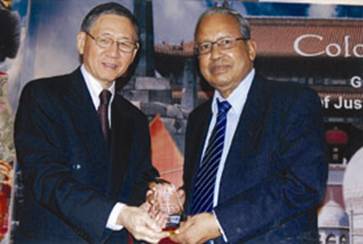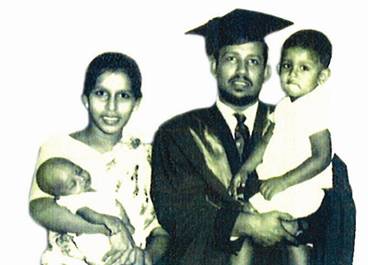|
NOTICES |
|
KS Rajah
I am sure many of you know my father KS Rajah, either personally or through the pages of this journal where he was regularly featured as a contributor.
He was born on 3 March 1930 in Prai, Penang, the first of what were ultimately 13 children. My grandfather was a lowly clerk and money was always a problem. In school, my father was not always able to afford to buy the books he needed, and he had to resort to borrowing the relevant books and copying out the relevant passages in long hand. He was still in school during the Japanese invasion. All students were taught Japanese and he displayed his proficiency for languages, becoming sufficiently fluent that he was able to supplement the family income, first by working as the mess boy at the Japanese officers’ mess, then by working as a translator for the Japanese authorities. Later, whilst a Deputy Public Prosecutor in Singapore, he taught himself Mandarin.
After the war, although he was keen to continue his studies, the family’s straitened financial circumstances precluded it. He left school at 16 and started working for the Penang port authority as a wireless operator, mastering Morse code in the process.
One day, he came across an advertisement for trainee teachers in Singapore at a significantly higher pay than what he was earning as a wireless operator. Accordingly, he packed his bags and moved to Singapore, where he became a trainee teacher at Sembawang Primary School. He showed sufficient aptitude at teaching such that he was selected for further training in England. On his return, he was posted to the Teacher Training College as a lecturer. During my school days, I was repeatedly told by many of my teachers that they had been taught by my father.
1959 was a momentous year for my father. The University of Singapore opened its law faculty, offering for the first time, law degrees for students in Singapore. It offered a part-time course, enabling working adults to obtain a degree whilst continuing with their employment. My father applied and was accepted for the pioneer batch of undergraduates. The opportunity to study at the university was so significant for my father that when came time to buy a house, he chose one off Dunearn Road, as it would be convenient to get to the Bukit Timah campus. This was to be his home in Singapore till the day he passed away. It was also in 1959 that he was introduced to my mother and in December 1959, they were married. Thirteen months later, I was born.
My father was a diligent student. A favourite anecdote told by his contemporaries is that he was always seated in the front row at lectures! He graduated in 1963, shortly after my sister Jothie was born. He applied for and was accepted into the Singapore legal service as a Deputy Public Prosecutor.
Notwithstanding that my father now had his own family to look after, he continued to support his siblings. Well into my early teens, various uncles and aunts stayed at our home as my father supported them through their further education at the University of Singapore.
My father’s generation was placed on the cusp of history. Independence (as part of Malaysia) was closely followed by separation. Many expatriate civil servants decided to leave for the mother country and the locals who stayed on rose rapidly into positions of responsibility at a rate that would be unimaginable today. My father was thrust into the thick of things and he took on many high profile cases. He was involved in the prosecution of cases such as the Pulau Senang, Sunny Ang and Gold Bar murder trials. The Pulau Senang trial was the result of a prison riot at the penal settlement of Pulau Senang which resulted in three wardens being killed. There were 58 accused and the trial lasted more than 60 days. It was the mega trial of its day. A few years later, in 1967, he prosecuted in another mega-trial, that of 262 members of the Barisan Sosialis party for unlawful assembly. I believe that this still remains as Singapore’s largest criminal trial in terms of the number of accused persons. He was also the assisting counsel for the Commission of Inquiry into the Robinson store fire.
He rose to become Head of Crime in the Attorney-General’s Chambers before being rotated to serve as Head of the Civil Section. In 1972, he was appointed the Official Assignee and Public Trustee (“OAPT”). But this did not take him out of the limelight. Soon after he was appointed, the Gemini Chit Fund case broke. My father, as OAPT, was appointed as liquidator of the chit fund company. Soon thereafter, he was transferred to the Legal Aid Bureau, where he remained until his retirement in 1985, as its longest serving director.
He was briefly in private practice, going into partnership with Balu Rao in the firm B Rao & KS Rajah. In 1991, he was appointed to the Bench as a Judicial Commissioner. His most notable decisions whilst on the Bench were in the area of family law, namely, Lim Ying v Hiok Kian Ming 1991 2 SLR (R) 525 (same sex marriage after sex change), Chan Yeong Keay v Yeo Mei Ling 1994 2 SLR (R) 133 (the entitlement of the house husband to a share of the matrimonial assets), and Ho Ah Chye v Hsienchieh Hsu Irene 1994 1 SLR (R) 485 (recognition of foreign divorces).
He retired from the Bench in 1995 and joined his old friend (and former student) Harry Elias in practice. He remained with Harry Elias Partnership LLP until he passed away in June of this year.
In 1996 he was appointed as the first President of the Tribunal for the Maintenance of Parents. He was one of the inaugural batch of Senior Counsel appointed in 1997.
At this stage of his career, he focused mainly on sitting as an arbitrator. He was on the International Chamber of Commerce and was frequently appointed for arbitrations seated in India and Bangladesh. But he still appeared in Court in selected cases, in particular, when he felt the case in hand involved an issue of constitutional law or principle which would otherwise not be addressed. An example of this is the recent Horizon Towers case, which was the last case he did before being diagnosed with cancer.
My father was a spiritual man and served on the Hindu Endowments Board, where in particular, he did much to improve the working conditions of the temple priests. He was a founder of the Hindu Society and at various times, served on many temple committees. He was also the president and an active member of the Aurobindo Society here in Singapore and a frequent visitor to the Aurobindo Ashram in Pondicherry, India. He served the Kong Meng San Phor Kark See Monastery at Bright Hill and on the Board of Mt Alvernia Hospital. His volunteer work also covered the secular and he was one of the founding vice-presidents of the Singapore Anti Narcotic Association, and a committee member of the Society for the Physically Disabled.
At his wake, many strangers approached me to tell me how my father had assisted them, sorting out problems they had got into with various government departments. One elderly gentleman told me how after a year of knocking on doors, even his Member of Parliament had told him that nothing could be done, but that my father had personally taken on his case and saved both his job and his home.
My father was diagnosed with a rare form of cancer, angiosarcoma, in July last year. He had to undergo a very difficult and painful regime of treatment, involving multiple operations, chemotherapy, radiation and daily visits to the hospital. The cancer was in his scalp and ultimately all of his scalp was removed. He bore this pain and inconvenience with characteristic fortitude and courage. Unfortunately, it was not to be and he finally succumbed.
With his passing, many people have paid tribute to my father, his character, his principles, his service to the public and to legal scholarship, his selflessness and generosity to others. I would like to end with these words from Mr Philip Fong, Managing Partner at Harry Elias Partnership LLP:
Mr Rajah was a man of superlatively high standards, complete integrity, and boundless enthusiasm for whatever task he took in hand. No one, whose privilege it was to know him, is likely to forget the candor of his speech, the courage of his faith, the warm and glowing brightness of his friendship. He never dodged a responsibility, never refused to take on a hard job if it needed to be done. What he preached, he practised. What he believed, he believed with heart and soul. He fought hard for every cause in which he enlisted, and the causes for which he fought were good and right. In his passing, we have lost a great and good friend, judge, advocate and colleague, whose encouragement, counsel and wisdom have meant so much to us over the years. The cause of justice has lost a leader who gave unstintingly of his labour and his life.
S Suressh
Harry Elias Partnership LLP

